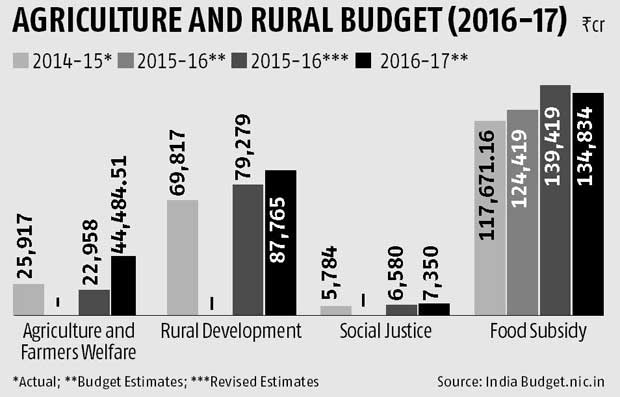Finance Minister Arun Jaitley’s budget speech put agriculture and the rural economy on top of the agenda for the government in 2016-17.
Two consecutive droughts and record low farm prices forced the finance minister to raise the allocation for agriculture and farmers’ welfare by 94 per cent.
Read our full coverage on Union Budget 2016
The hike, among the biggest in recent times, includes a Rs 15,000-crore interest subvention for short-term crop loans.
Jaitley introduced a Kisan Kalyan Cess at the rate of 0.5 per cent on all taxable services through which Rs 5,000 crore will be garnered. “We need to think beyond food security and give our farmers a sense of income security. The government will, therefore, reorient its interventions to double the income of the farmers by 2022,” the minister said in Parliament.


An amount of Rs 368 crore has been provided for soil health cards, up from Rs 200 crore in 2015-16.
“The benefits of transferring the fertiliser subsidy directly to beneficiaries are wide-ranging and will bring immense benefits to all the stakeholders — the government, farmers, fertiliser manufacturers, and the public,” fertiliser company IFFCO said in a statement.
A major portion of Jaitley’s speech was devoted on what the Centre planned to make Indian farming drought-proof. Irrigation schemes captured a major portion of his budget announcements, including excise duty concessions on pump-sets.
For the Prime Minister’s Fasal Bima Yojana, Jaitley allocated over Rs 5,500 crore against an annual requirement of over Rs 8,800 crore.
He also announced a three-pronged strategy to ensure farmers received the minimum support price set by the Centre. This includes encouraging states to take up decentralised procurement, starting an online procurement system through the FCI, and making effective arrangements for procurement of pulses.
For the dairy and animal husbandry sector, the finance minister announced three new programmes with an allocation of over Rs 850 crore.
Jaitley said to increase crop yields in rainfed areas, which account for nearly 55 per cent of the country’s arable land, organic farming would be promoted for which the Centre was allocating Rs 412 crore.
“A national level competition will be held among 674 Krishi Vigyan Kendras with a total prize money of Rs 50 lakh to improve the efficiency and performance of these kendras,” Jaitley announced.
The finance minister lowered the food subsidy for 2016-17 to Rs 134,834 crore against a revised estimate of Rs 139,419 crore, while raising the allocation for the price stabilisation fund to Rs 900 crore from Rs 500 crore in 2015-16.
“The Budget has a very obvious rural development focus. The finance minister has shared his vision of providing socio-economic security for the farming community. We believe the focus on rural electrification, skill development schemes, farming-focused interventions, farm-to-market connectivity, agriculture and farmer welfare schemes will impact the rural community favourably,” said Arun Nagpal, co-founder of the Mrida Group, a social business venture focussed on rural India.

)
